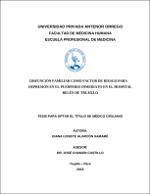| dc.contributor.advisor | Chaman Castillo, Jose | |
| dc.contributor.author | Alarcon Samame, Diana Lissete | |
| dc.creator | Alarcon Samame, Diana Lissete | |
| dc.date.accessioned | 2016-11-21T15:28:53Z | |
| dc.date.available | 2016-11-21T15:28:53Z | |
| dc.date.issued | 2016 | |
| dc.identifier | T_MED_1873 | |
| dc.identifier.uri | https://hdl.handle.net/20.500.12759/2132 | |
| dc.description.abstract | Evaluar si la disfunción familiar es un factor de riesgo para depresión en epuerperio inmediato en el Hospital Belén de Trujillo.
Material y métodos: Se llevó a cabo un estudio tipo analítico, observacional,
prospectivo, de casos y controles en el Hospital Belén de Trujillo durante el período
Enero – Febrero 2016, evaluando 90 puérperas quienes respondieron la Escala deDepresión Postnatal de Edimburgo para determinar su condición de caso o control paraluego ser divididas en dos grupos de 45: Grupo casos (mujeres con depresión postpartoy Grupo controles (mujeres sin depresión postparto) y se cuantificó la disfuncionalidad
familiar con el cuestionario de APGAR familiar en ambos grupos.
Resulltados: Del total de puérperas, 57 presentaron disfunción familiar de las cuales: e70,2% pertenece al grupo con depresión puerperal (OR= 13,176; IC al 95%= 4,35-39,89
y un valor de p<0,001) y el 29,8% al grupo sin depresión. De las 33 pacientes sindisfunción familiar, sólo el 15,2% presentaron depresión. Así mismo, del total depuérperas con disfunción leve, el 75% pertenece al grupo con depresión puerperal. Degrupo con disfunción moderada, el 66,7% tuvo depresión, mientras que aquellas con
disfunción severa, el 63,6% presentó depresión. Se concluyó que la disfunción familiaes un factor de riesgo para depresión en el puerperio inmediato en el Hospital Belén deTrujillo. La edad materna, edad gestacional, paridad y el destino del recién nacido nomostraron asociación significativa con el riesgo de depresión puerperal.
Conclusiones: La disfunción familiar es un factor de riesgo para depresión en epuerperio inmediato en el Hospital Belén de Trujillo. No existen diferenciassignificativas en relación a la edad materna, edad gestacional, destino del recién nacido yparidad en las puérperas de ambos grupos de estudio. | es_PE |
| dc.description.abstract | To evaluate whether familiar dysfunction is a risk factor for depression in the
immediate puerperium period at the Belen’s Hospital of Tujillo.
Material and methods: Was conduced an analytic, observational, prospective, casecontrol
study at the Belen’s Hospital of Tujillo during the period January-February 2016 evaluating 90 puerperium women which answered Scale Edinburgh Postnatal
Depression to determine its case or control status before being divided in two groups of
45: Cases group (women with postpartum depression) and controls group (women
without postpartum depression) and family dysfunction was quantified with the APGAR
family questionnaire in both groups.
Results: Of all postpartum women, 57 have family dysfunction of which: 70.2%
belongs to the group with postpartum depression and 29.8% to the group without
depression. Of the 33 patients without family dysfunction, only 15.2% had depression.
Also, of all postpartum women with mild dysfunction, 75% belongs to the group with
postpartum depression. The group with moderate dysfunction, 66.7% had depression,
while those with severe dysfunction, 63.6% had depression. It was concluded that family
dysfunction is a risk factor for depression in the immediate postpartum period at the
Belen’s Hospital of Tujillo. Maternal age, gestational age, parity and the fate of the
newborn showed no significant association with the risk of postpartum depression.
Conclusions: The familiar disfunction is a risk factor for depression in the immediate
puerperium period at the Belen’s Hospital of Tujillo. There aren’t significant differences
in maternal age, gestational age, fate of the newborn and parity in postpartum women in
both study groups. | en_US |
| dc.description.uri | Tesis | es_PE |
| dc.format | application/pdf | es_PE |
| dc.language.iso | spa | es_PE |
| dc.publisher | Universidad Privada Antenor Orrego | es_PE |
| dc.rights | info:eu-repo/semantics/openAccess | es_PE |
| dc.rights.uri | https://creativecommons.org/licenses/by/4.0/ | es_PE |
| dc.source | Universidad Privada Antenor Orrego | es_PE |
| dc.source | Repositorio Institucional - UPAO | es_PE |
| dc.subject | Disfunción familiar. | es_PE |
| dc.subject | Depresión Postparto | es_PE |
| dc.title | Disfunción familiar como factor de riesgo para depresión en el puerperio inmediato en el hospital Belén de Trujillo | es_PE |
| dc.type | info:eu-repo/semantics/bachelorThesis | es_PE |
| thesis.degree.level | Título Profesional | es_PE |
| thesis.degree.grantor | Universidad Privada Antenor Orrego. Facultad de Medicina Humana | es_PE |
| thesis.degree.name | Médico Cirujano | es_PE |
| thesis.degree.discipline | Medicina Humana | es_PE |
| dc.subject.ocde | https://purl.org/pe-repo/ocde/ford#3.02.27 | es_PE |
| renati.type | https://purl.org/pe-repo/renati/type#tesis | es_PE |
| renati.level | https://purl.org/pe-repo/renati/level#tituloProfesional | es_PE |
| renati.discipline | 912016 | es_PE |
| dc.publisher.country | PE | es_PE |


